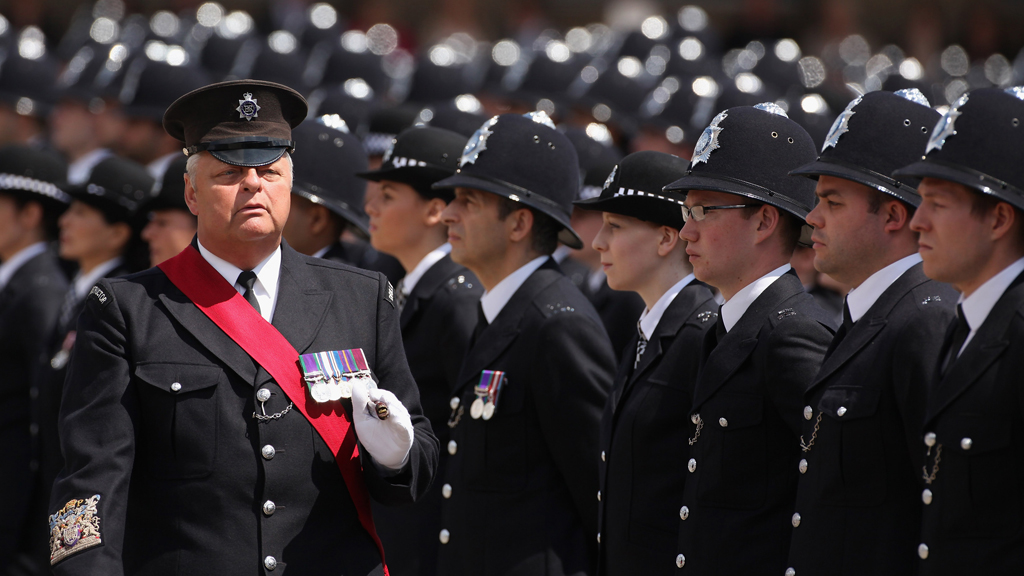Wanted: police superintendent – no experience necessary
People with no experience of policing will be allowed to join forces at superintendent level under new reforms unveiled today.

Policing minister Damian Green also announced that foreign police chiefs will able to run British constabularies for the first time.
Other reforms will see new starters fast-tracked to the rank of inspector, skipping the compulsory two years on the beat.
The changes, many of which were put forward by Tom Winsor in a major review of police pay and conditions, represent a major shift in police recruitment practice.
Currently, all officers must enter as constables, and senior officers are only promoted after gaining operational experience in the ranks. The reforms generated immediate criticism on social media, with the Police Federation – which represents rank and file officers – warning of the danger of allowing those without police experience to manage officers:
Public could be put at risk if supermarket mangers can leapfrog into senior police ranks, says vice-chair @pfew_hq: ow.ly/hfRzX
— PFEW (@PFEW_HQ) January 30, 2013
Without those years as a PC walking in ur officers shoes how can you understand operational context of incidents and staff u lead? U can’t.
— Lee Freeman (@LincsCSupt) January 30, 2013
Mr Winsor suggested a scheme to allow “exceptional” individuals from the Armed Forces, the security services and the world of business to enter the police directly at superintendent level after 15 months of training.
Mr Green has launched a two-month consultation on proposals allow chief officers in countries with similar legal systems to the UK – such as the United States, Canada, Australia, New Zealand and India – to become chief constables here.
Current legislation prevented Bill Bratton, former head of the New York police department, from applying to take charge of the Metropolitan Police in 2011.
Some of the proposals are likely to be unpopular with serving officers.
The most senior ranks of the police service will be improved further by the infusion of experience and expertise gained in other disciplines. Tom Winsor
Mr Winsor acknowledged in his report that the idea of allowing direct entry to the rank of superintendent “has occasioned the most anxious consideration and the greatest hesitation on my part”.
He added: “It is fully acknowledged that the great majority of police officers, including at chief officer rank, are opposed to this reform, or have expressed considerable misgivings.”
But he insisted the change was needed to open up Britain’s “closed, defensive and inward-looking” police culture, adding: “The most senior ranks of the police service will be improved further by the infusion of experience and expertise gained in other disciplines.”
To command a policing operation effectively, a senior officer should have first-hand experience of responding to incidents in an operational capacity. Steve White
Steve White, vice-chairman of the Police Federation, which represents rank-and-file officers in England and Wales, said: “The Police Federation does not support proposals that would allow external candidates to join the police service at any rank above that of constable.
“We believe the rank structure allows officers to perfectly equip themselves for their next role within the service.
“To command a policing operation effectively, a senior officer should have first-hand experience of responding to incidents in an operational capacity.”
Sir Peter Fahy from the Association of Chief Police Officers said: “All chief constables have served on the beat, experiencing the reality of day-to-day operational policing with the public.”
He added: “Acpo has no problem with bringing in expertise from outside and in many forces up to 50 per cent of staff are non-police officers. Every force has senior civilian staff in top leadership positions in such fields as human resources, finance and IT.
“On the other hand such matters as firearms operations, murder investigations and dealing with public disorder are commanded by those with proven expertise and records of achievement.”
The Mayor of London, Boris Johnson, said: “These reforms will help open up the force to the best and the brightest outside talent, talent that has previously been beyond our reach.
“By having a bigger pool of experience from which to choose the Metropolitan Police will inevitably be more representative of the city it serves, across all its ranks.”